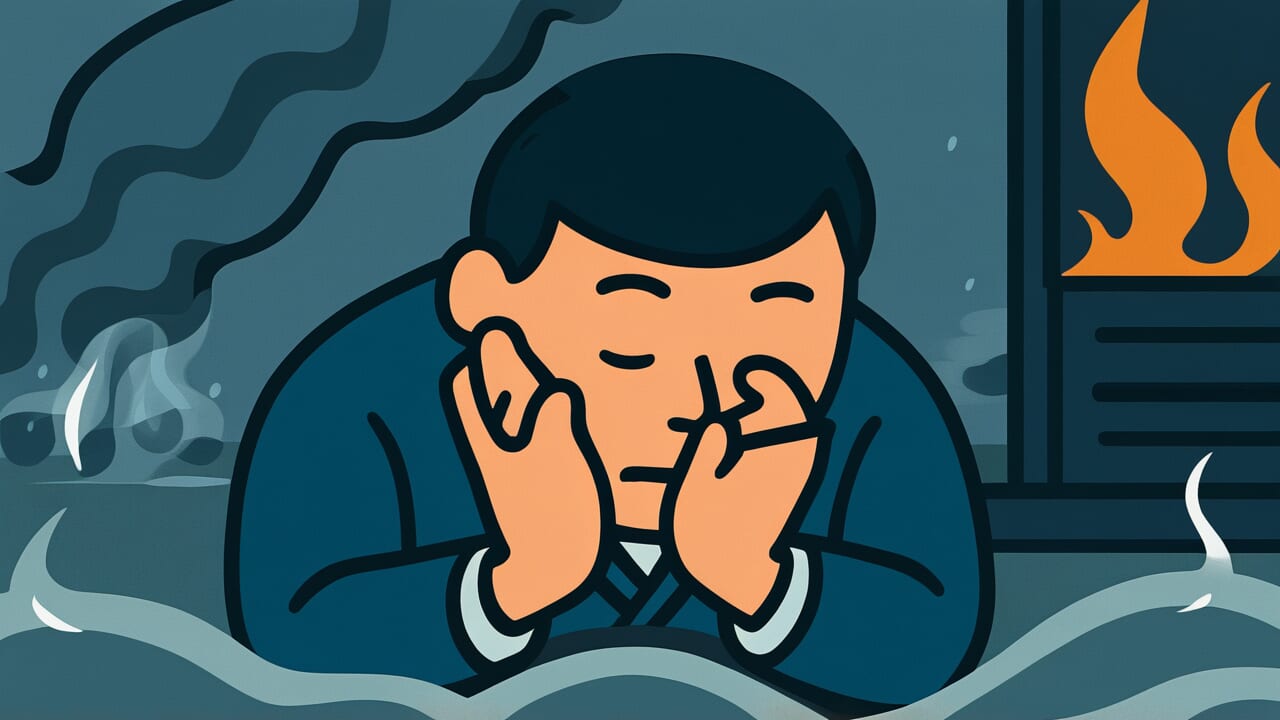How to Read “Sleepy, smoky, cold”
Nemui kemui samui
Meaning of “Sleepy, smoky, cold”
“Sleepy, smoky, cold” lists three discomforts that people find especially hard to endure. This proverb describes unpleasant states that aren’t life-threatening but are difficult to overcome through willpower alone.
Sleepiness is an irresistible physiological need. Smoke irritates your eyes and throat unbearably. Cold drains your energy from deep within your body.
People use this proverb when they want to express hardships everyone can relate to. It conveys the subtle suffering of “not impossible to endure, but truly painful” in a simple way.
You can also use this proverb when complaining about difficulties. It lets you express your struggles with a touch of humor without sounding too serious. Even today, it remains an expression everyone can understand as basic human discomfort.
Origin and Etymology
The exact literary origin of this proverb remains unclear, but its structure offers interesting insights. The three adjectives “nemui,” “kemui,” and “samui” all end with “i,” creating a rhythmic pattern.
Japanese has long favored listing things in threes. This number makes phrases memorable and persuasive.
These three discomforts were chosen because of traditional Japanese living conditions. In old Japanese houses, people used hearths and stoves that filled rooms with smoke daily.
Winter cold in poorly insulated wooden houses was far harsher than today. And sleepiness has always been an irresistible human condition regardless of era.
What’s interesting is that all three share a common trait. They’re “bearable if you try, but extremely unpleasant.” They’re not life-threatening crises, yet they’re discomforts that willpower alone can’t easily overcome.
Our ancestors accurately put these subtle sufferings into words through daily life. They created an expression that resonated with everyone and became established over time.
Usage Examples
- That worksite after my night shift was truly awful with the triple suffering of sleepy, smoky, cold
- Winter camping while sleep-deprived and getting smoke from the campfire gives you all three: sleepy, smoky, cold
Universal Wisdom
“Sleepy, smoky, cold” reveals a deep insight about two types of human suffering. One is life-threatening crisis. The other doesn’t threaten life but greatly damages daily quality of living.
This proverb has been passed down because our ancestors understood something important. The second type of suffering actually erodes human daily life the most.
Sleepiness, smoke, and cold rarely kill anyone directly. However, they steal concentration, dull judgment, and eliminate mental resilience.
What’s interesting is that all three are “bearable in small amounts.” That’s precisely why people are forced to endure them. This accumulation becomes major stress over time.
This proverb contains a gentle gaze toward human weakness. By acknowledging “it’s natural to struggle with these,” it may resist the culture of forcing unreasonable endurance.
Rather than demanding perfect strength, it accepts human-like weakness. That’s where the universal wisdom of this proverb lies.
When AI Hears This
The human brain has three independent neural systems for maintaining wakefulness. When all three are attacked simultaneously, consciousness levels drop multiplicatively. This is the true terror of sleepiness, smoke, and cold.
First, sleepiness directly suppresses the arousal center in the hypothalamus. Next, carbon monoxide in smoke binds with hemoglobin in blood, blocking oxygen supply to the brain.
Reduced oxygen lowers brain metabolic activity, depleting energy needed to maintain wakefulness. Cold concentrates blood in the body’s core for temperature regulation, reducing blood flow to the brain.
As body temperature drops, the speed of cellular chemical reactions slows down. Neurotransmitter release also becomes sluggish.
What’s fascinating is that these effects multiply rather than simply add up. If sleepiness alone drops alertness to 70 percent, adding smoke at 80 percent and cold at 85 percent gives you 0.7×0.8×0.85, about 47 percent.
With all three together, alertness drops below half.
Ancient people had no MRI or EEG machines. Yet they empirically recognized that this combination was especially dangerous. This wasn’t coincidence.
It was a physiologically perfect combination that simultaneously neutralizes the brain’s three independent arousal systems.
Lessons for Today
“Sleepy, smoky, cold” teaches modern people not to dismiss small discomforts. Today’s society pressures us with “you should endure this much.” We accept sleep deprivation and uncomfortable environments as normal.
However, this proverb teaches the importance of acknowledging an obvious fact. “What’s hard to endure is hard to endure.”
What matters is knowing your limits and having the courage to admit them honestly. If you’re sleepy, rest. If it’s smoky, ventilate. If you’re cold, warm yourself.
Simple responses protect long-term performance and health. Our ancestors knew that forced endurance isn’t a virtue. It actually causes bigger problems.
When you feel “this is hard to endure” in daily life, that’s an honest message from your body and mind. Listen to that voice and respond appropriately.
This becomes the first step toward fulfilling days.



Comments